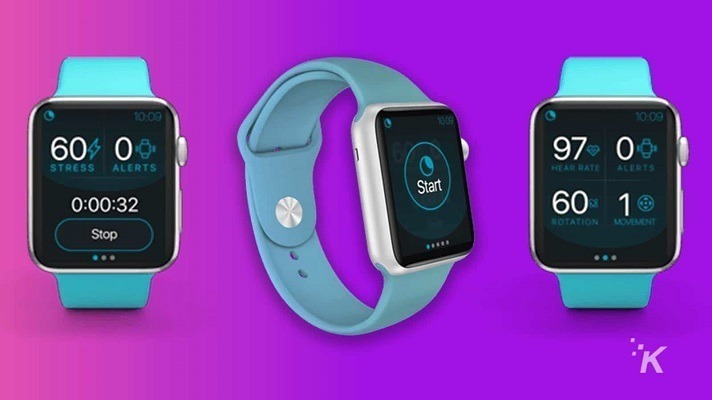FDA grants clearance for NightWare app designed to reduce PTSD-related nightmares
 FDA grants De Novo clearance to prescription Apple Watch app for nightmare disorder (MobiHealth News):
FDA grants De Novo clearance to prescription Apple Watch app for nightmare disorder (MobiHealth News):
The FDA granted Minneapolis-based NightWare a De Novo clearance on Friday for its Apple Watch and iPhone app designed to improve the sleep quality of those experiencing nightmare disorder and nightmares related to PTSD.
The digital therapeutic – which received breakthrough designation from the agency last year – uses the Watch’s sensors to track the heart rate and movement of users as they sleep. After establishing a baseline profile for the patient within one or two nights’ sleep, the machine learning algorithm spots heart rate or movement abnormalities presumably caused by a nightmare. The application then vibrates the smartwatch just enough to interrupt the wearer’s dreaming, but not enough to wake them up or disrupt their circadian sleep cycle.
The digital therapeutic is intended for home use among adults aged 22 years or older and will require a prescription. The agency stressed in the announcement that it is not a standalone therapy for PTSD and should be used alongside other prescribed medications or recommended therapies.
The FDA Announcement:
FDA Permits Marketing of New Device Designed to Reduce Sleep Disturbance Related to Nightmares in Certain Adults (press release):
Today, the U.S. Food and Drug Administration permitted marketing of a new device intended for the temporary reduction of sleep disturbance related to nightmares in adults 22 years or older who suffer from nightmare disorder or have nightmares from post-traumatic stress disorder (PTSD). The device provides gentle vibration through touch based on an analysis of heart rate and motion during sleep.
“Sleep is an essential part of a person’s daily routine. However, certain adults who have a nightmare disorder or who experience nightmares from PTSD are not able to get the rest they need. Today’s authorization offers a new, low-risk treatment option that uses digital technology in an effort to provide temporary relief from sleep disturbance related to nightmares,” said Carlos Peña, Ph.D., director of the Office of Neurological and Physical Medicine Devices in the FDA’s Center for Devices and Radiological Health …
This device was studied in a 30-day randomized, sham-controlled trial of 70 patients. A sham therapy is an inactive treatment or procedure that is intended to mimic as closely as possible a therapy in a clinical trial. Patients in the sham group wore the device, but no vibratory stimulation was provided. Safety was assessed using validated measurements of suicidality and sleepiness, and there were no changes in either over the course of the study in either group. Sleep was assessed with two versions of the Pittsburgh Sleep Quality Index scale, the self-rated questionnaire for assessing sleep quality, including a version of that scale that is intended for patients with PTSD. Both the sham and active groups showed improvement on the sleep scales, with the active group showing greater improvement than sham. The evidence demonstrated the probable benefits outweighed the probable risks.
News in Context:
- FDA clears first videogame to be prescribed to kids with ADHD: EndeavorRx by Akili Interactive Labs
- Five reasons the future of brain enhancement is digital, pervasive and (hopefully) bright
- Pear Therapeutics raises $50M to develop and market a portfolio of digital therapeutics for mental health
- Mindstrong Health raises $14 million to modernize the diagnosis and treatment of neuropsychiatric disorders via artificial intelligence (AI) and smartphones
- The FDA creates new Digital Health unit to reimagine regulatory paths in the age of scalable, AI-enhanced innovation


